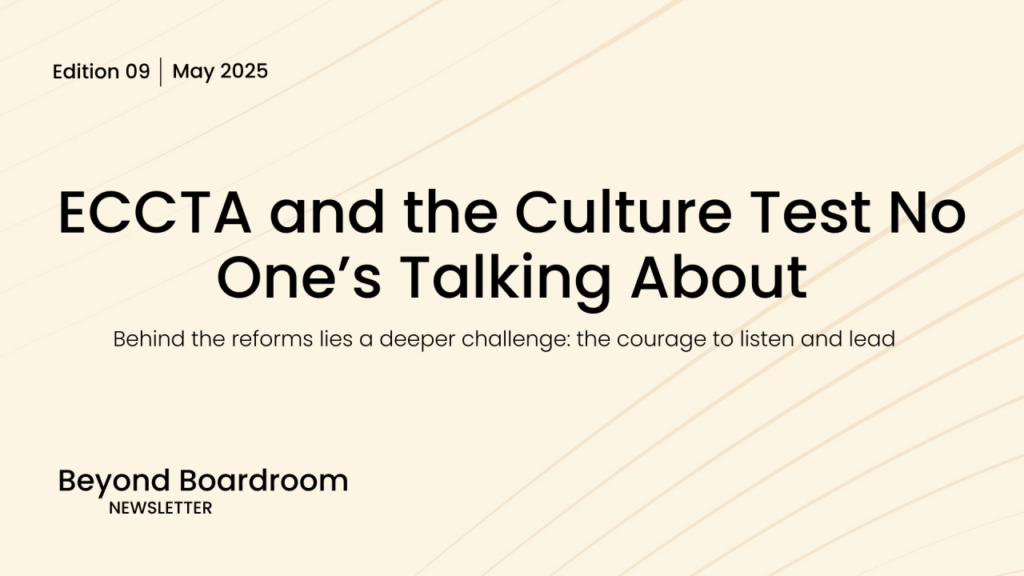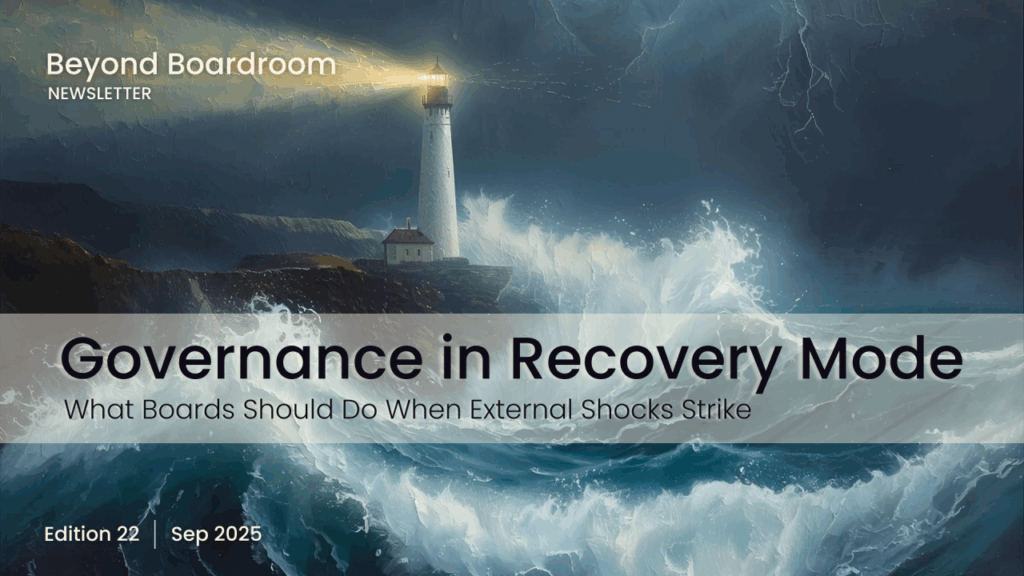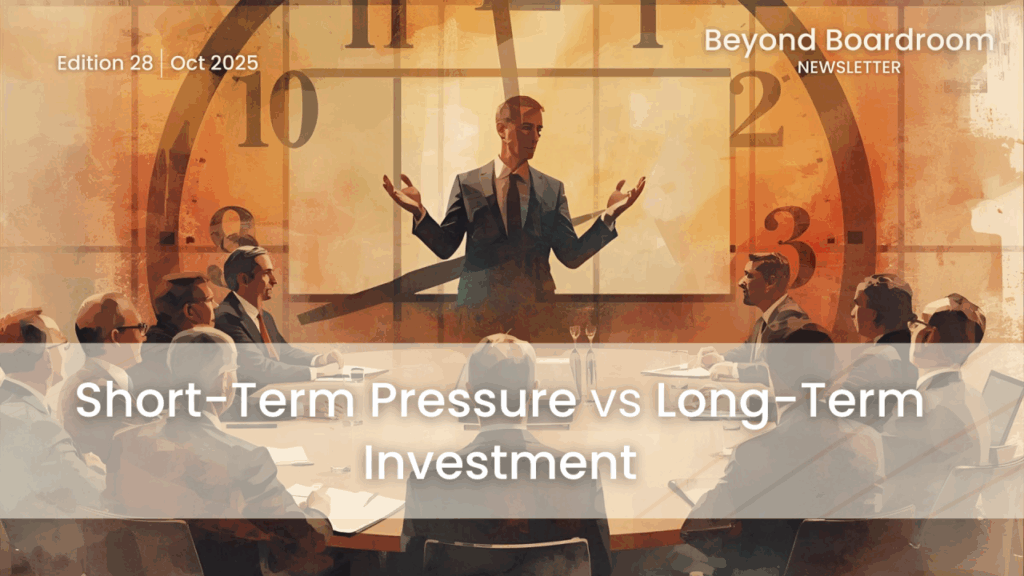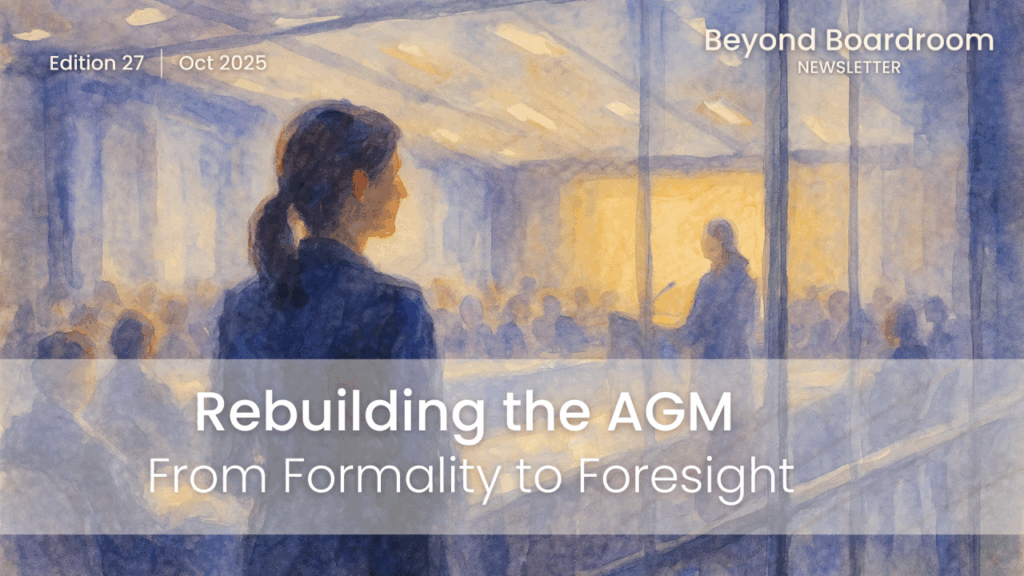This morning, I opened the ECCTA Forum to a room full of governance professionals, each bringing their own experience, questions, and hopes about where British corporate governance is heading next.
The agenda may have read like a technical session on legislative reform. But the energy in the room told a different story.

What’s really happening here is not just a change in statute. It is a test of culture.
We are entering an era where the formalities of governance — minutes, registers, reporting lines — will no longer carry the weight they once did unless they are underpinned by something deeper: a leadership culture built on clarity, trust, and the confidence to speak up.
And that shift is already underway.
Beyond Procedure: A Cultural Reckoning
The Economic Crime and Corporate Transparency Act brings with it a set of new expectations. Tougher requirements. Greater transparency. Clearer director accountability.
But none of this will mean much if our organisational cultures still quietly discourage people from asking hard questions.
You can have the most detailed governance framework in place, but if individuals are holding back thoughts, insights, or objections for fear of backlash, you do not have governance. You have performance.
It is the unspoken dynamics — the unsent emails, the nervous silences in meetings, the deflected concerns — that tell us whether governance is working or merely being performed.
This Act is an opportunity to confront that. Not just through compliance, but through the culture we lead and the tone we set.
The Real Accountability Challenge: Voice
Boards are no longer expected to be just guardians of shareholder value. They are now seen as stewards of institutional trust. That is a higher bar, and a more visible one.
It requires directors to do more than oversee. It requires them to ask, listen, and adapt.
This is the real culture test:
- Are your people able to challenge decisions without consequence?
- Are concerns surfaced early and responded to constructively?
- Does leadership invite perspective, or just tolerate it?
The companies that will lead in this next chapter are those that move past the formalities of voice and embed it into how decisions are made, risks are flagged, and progress is measured.
That does not begin with policy. It begins with practice. With how we react the moment someone says, “I’m not sure this is right.”
Governance as Strategy, Not Sentiment
The ECCTA should not be seen as a threat to growth or agility. Governance should not be treated as a brake on innovation.
Governance, when done well, creates the conditions for both. It gives organisations the clarity to move decisively and the assurance to act boldly.
If compliance feels like a constraint, we have misunderstood it. True compliance is not box-ticking, it is boundary-setting. It enables people to know where they stand, to challenge within clear terms, and to innovate without destabilising trust.
This is what I mean when I say governance must become strategic. It must support commercial ambition while maintaining ethical rigour. It must work at speed, without sacrificing scrutiny.
And most importantly, it must earn trust through consistency, not through messaging.
Silence Is a Signal
One of the most significant risks in any organisation is not misconduct. It is silence.
Silence when something does not sit right.
Silence when the boardroom leans too far into consensus.
Silence when decisions are made without context or consultation.
In governance, silence is often the first sign of decline.
And yet we still reward it. We still mistake quiet for control. We still allow hierarchy to mute insight.
It is time we start treating psychological safety as infrastructure. Not as a culture initiative, but as a core governance mechanism.
We must design environments where people feel not just able, but responsible, to speak. Where challenge is seen as commitment. And where leadership means making it safe to say the thing that no one wants to hear.
This Is the Moment to Lead, Not React
Today’s conversation was not just about decoding new legislation. It was about confronting a bigger question.
What kind of culture are we building in British business?
Because policy alone does not protect a company. Culture does.
If we want our institutions to be resilient, our governance must go beyond the legal minimum. It must reflect an ongoing commitment to truth-telling, fairness, and long-term thinking.
That is the standard I believe the ECCTA is asking us to meet. Not just in terms of documentation, but in terms of discipline.
Leadership in this moment means being willing to go first. To listen differently. To make decisions that prioritise integrity even when the easier path lies elsewhere.
This is not about perfection. It is about posture.
Looking Ahead
For those of you who joined us today — thank you. You brought the energy, the questions, and the candour this moment calls for.
For those reading now — consider this your prompt. Bring these conversations back into your own boardrooms, teams, and leadership forums.
Ask what kind of silence exists in your organisation. Then ask what is needed to replace it with clarity.
Governance is no longer just about what is written down. It is about what is said out loud, and whether people feel able to say it.
This is the culture test no one is talking about. But it is the one that will shape the future of British business.
Until next time, stay grounded, listen well, and lead better,
Erika.



